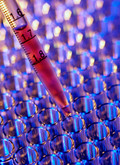Biosimilars
Australian prescribers’ views on biologicals naming and substitution
In a survey of 160 prescribers of biologicals in Australia, over three quarters agreed that the country’s Therapeutic Goods Administration (TGA) should insist on distinct non-proprietary scientific names for all biosimilars and reference products. The results of the survey were published just as TGA launched a public consultation on proposals for potential biological naming systems. A clear majority (98%) of prescribers who took part in the survey, run by the Alliance for Safe Biologic Medicines (ASBM), said they currently used either brand name or non-proprietary scientific names for recording and prescribing biosimilars and reference products [1]. Most (61%) wanted TGA to play a major role in naming biosimilars.
EMA accepts biosimilar pegfilgrastim application from Sandoz
Sandoz, the generics division of Novartis, announced on 27 October 2017 that the regulatory submission for its proposed pegfilgrastim biosimilar (LA-EP2006) had been accepted by the European Medicines Agency (EMA).
Biosimilar insulins – reducing the cost of diabetes
Will biosimilar insulins be cheaper is a question raised by authors Lutz Heinemann and Alan Carter and one that they say is a clear yes [1].
Hospira to pay Amgen US$70 million for epoetin alfa patent infringement
US-based injectables specialist Hospira has been ordered to pay Biotech giant Amgen US$70 million in damages regarding a patent on Amgen’s anaemia blockbuster Epogen (epoetin alfa).
European perspective on biosimilars
In the European Union (EU), a legal framework for approving biosimilars was established in 2003. The first biosimilar Omnitrope (somatropin) was approved in 2006 [1].
FDA launches educational campaign for biosimilars
In light of the increasing number of biosimilars becoming available in the US, the US Food and Drug Administration (FDA) announced on 23 October 2017 the launch of its education campaign for biosimilars.
Anti-drug antibody assays for biosimilars and originator biologicals
Biosimilar drug development has brought new challenges to bioanalytical ligand-binding assays used to determine drug concentration, anti-drug antibodies and neutralizing antibodies.
Novo Nordisk petitions FDA to require clinical trials for Victoza biosimilars
Danish pharmaceutical company Novo Nordisk has asked the US Food and Drug Administration (FDA) to require clinical trials for biosimilar applications for its blockbuster diabetes drug Victoza (liraglutide).
Challenges and opportunities in producing biosimilars
In a viewpoint article published in ACS Medicinal Chemistry Letters [1], Dahodwala and Sharfstein discuss the challenges and opportunities faced by biopharmaceutical manufacturers in producing biosimilars, equivalent versions of therapeutic proteins, and the role of regulatory agencies, particularly the US Food and Drug Administration (FDA), in approving these compounds.
FDA delays approval of Biocon/Mylan’s pegfilgrastim biosimilar
India-based biologicals specialist Biocon announced on 10 October 2017 that it has been informed by the US Food and Drug Administration (FDA) that its pegfilgrastim biosimilar, which it is developing jointly with Mylan, cannot be approved at present.












